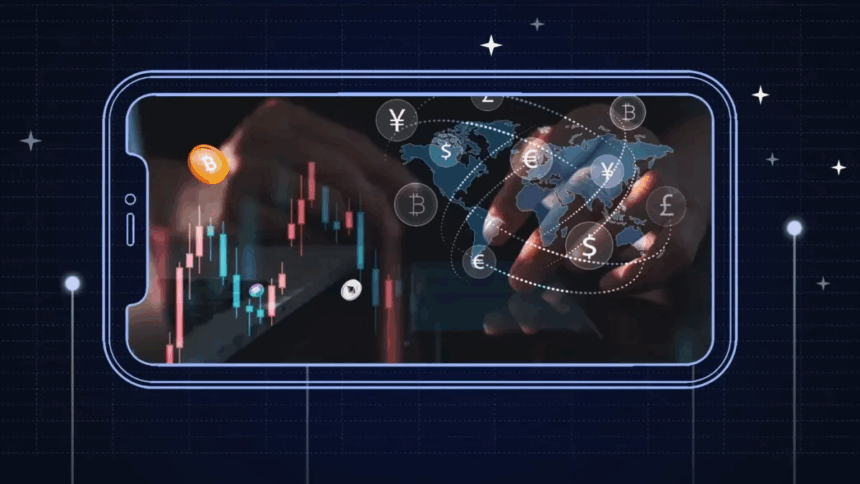This article discusses Reasons Why Forex Traders Are Moving Over To Crypto, an area experiencing great interest from many Forex traders. The 24/7 availability, increased volatility, and innovative trading resources are compelling Forex traders to dip their toes into crypto markets.
Moreover, the attributes of decentralized exchanges, artificial intelligence trading bots, and universal liquidity are revolutionizing trading methodologies.
Key Point & Reasons Forex Traders Are Switching to Crypto List
| Key Point | Description |
|---|---|
| 24/7 Trading Access | Crypto markets operate round-the-clock, allowing traders to react instantly to market movements anytime. |
| Higher Volatility and Profit Potential | Crypto assets experience larger price swings than traditional Forex, offering opportunities for higher returns with proper risk management. |
| Decentralized Exchanges (DEXs) | Traders can exchange assets directly without intermediaries, reducing reliance on centralized brokers and increasing transparency. |
| AI-Powered Bots and Signals | Advanced trading bots and AI signals help traders automate strategies and make data-driven decisions efficiently. |
| Lower Entry Barriers | Many crypto platforms allow small investments and fractional trading, making it accessible to new traders. |
| Faster Settlement Times | Crypto transactions settle within minutes, compared to traditional Forex settlement cycles, improving liquidity and flexibility. |
| Multi-Asset Wallets | Traders can store and manage multiple crypto assets in a single wallet, simplifying portfolio management. |
| Smart Contract Automation | Enables automated execution of trades and agreements without intermediaries, reducing errors and manual effort. |
| Access to Synthetic Assets | Traders can gain exposure to various financial instruments, including stocks and commodities, via tokenized derivatives. |
| Global Liquidity Pools | Large pools of liquidity across multiple exchanges improve trade execution and reduce slippage for traders worldwide. |
1. 24/7 Trading Access
Forex has limited business hours because it’s tied to global banking sessions. One of the “Reasons Forex Traders Are Switching to Crypto” is the accessible market. The difference is Forex trades in limited business hours, cryptocurrencies can be traded 24/7, 365 days a year. This includes market-moving events, news, and volatility.

Constant trading facilities flexible strategies and improved risk management. 24/7 trading also supports instantaneous decisions. Supported systems in Forex may be adjusted and enhanced for crypto systems. Forex diversity trading supports border adaptability, and constant trading improves strategy flexibility and risk management.
Pros & Cons 24/7 Trading Access
Pros:
- No time restrictions means trading can take place whenever, beneficial for those in different time zones.
- Making time sensitive trades very fast and eliminating the time cost to reach a target.
- The ability to adapt and change trading plans and for aggressive risk management.
Cons:
- No closing means it can lead to burnout.
- It can become a problem if it is not automated in some way.
- More availability can lead to more impulsive trades.
2. Higher Volatility and Profit Potential
Cryptocurrencies provide profit opportunities due to their higher price swings when compared to Forex. The potential to make gains in shorter timeframes is one of the main reasons Forex traders are now switching to crypto.

While Forex markets have more predictable movements, Bitcoin and Ethereum and other cryptocurrencies frequently experience double-digit movements in price within a single day. High risk traders are able to manage and balance these price swings profitably. Higher volatility and risk seeking traders provide potential to profit quickly.
Pros & Cons Higher Volatility and Profit Potential
Pros:
- Higher risk rewards means more money in your pocket.
- Able to mix different styles like day trading and swing trading as there are more opportunities within a shorter time.
- Good for people who like fast paced environments.
Cons:
- Can lead to a big loss if a proper risk management plan is not in place.
- Swings can lead to loss of money if a proper risk management plan is not in place.
- Can be a steep learning curve if a proper risk management plan is not in place.
3. Decentralized Exchanges (DEXs)
Decentralized Exchanges (DEXs) allow for foundational peer-to-peer transactions without the involvement of any intermediary.

This is one of the most significant advantages for Forex traders switching to crypto. Transparent and secure access to digital assets is self-custodial and the trader retains complete control. Forex traders are unsatisfied with reliance on trust-based counterparties, heavy regulation, and risk potentials involved with traditional centralized brokerages.
The trader’s privacy is further improved and costs are reduced to zero to transact from their own assets with DEXs. The plethora of innovations and uncapped DEX-based digital asset trading strategies are vexing for traditional Forex traders with archaic financial trading instruments.
Pros & Cons Decentralized Exchanges (DEXs).
Pros:
- Traders can trade with one another directly with no intermediaries.
- Counterparty risk is mitigated because of the increased transparency.
- The fees are less than what one would pay to centralized brokers.
Cons:
- There is a lack of customer support compared to centralized exchanges.
- Beginners might find this challenging.
- Some tokens might experience lower liquidity which might result in slippage.
4. AI-Powered Bots and Signals
AI trading instruments and signals change how strategies are implemented by traders. One key reason Forex traders are switching to crypto is the access to sophisticated AI bots that monitor the crypto market all day and night, assess the shifting market patterns, and execute trades without human assistance.

These bots perform market trend analyses and ensure timely profitability. Forex traders used to more manual processes will consider the AI system implementation in crypto trading to be a significant advancement due to the accurate, timely, and complex strategies that can now be implemented without the risks and errors inherent in human manual trading.
Pros & Cons AI-Powered Bots and Signals
Pros:
- Trading can be automated, thus saving time and effort.
- Decision-making can be improved using advanced data analysis.
- Markets can be monitored non-stop which decreases missed opportunities.
Cons:
- Excessive dependency may lead to faulty decisions if the AI fails.
- Bots not only have to be set up but also need ongoing supervision.
- Advanced AI, which are usually subscription services, tend to be overpriced.
5. Lower Entry Barriers
The rise of crypto trading comes with minimum investment requirements. This is one reason Forex traders are switching to crypto, given that they can trade Forex with high account requirements and are now used to trading high amounts. With crypto, they can still borrow money to open a smaller account, which takes a lot of risk away from them.

This also gives veteran traders more risk to manage and more strategies to handle at once. The crypto market is more accessible and much more affordable. This is especially true for Forex traders with lower amounts. They are now able to change, diversify, or grow their portfolio, which is a huge investment crypto trading offers.
Pros & Cons Lower Entry Barriers
Pros:
- Small investors are welcomed and traders can invest in fractional assets.
- This diminishes the financial risk for new traders.
- This caters to the ability to shift in and out of assets, which can be useful in the risk management process.
Cons:
- At the start, small investments usually yield smaller returns, which can be disheartening.
- Inexperienced traders may lose confidence and try to scale up.
- Some platforms are not overseen by financial authorities, which can create security concerns.
6. Faster Settlement Times
One of the most appealing aspects of crypto for Forex traders is the quick settlement of transactions enabled by blockchain technology. Traditional Forex trading can have settlements that take several days due to delays in banking and cross-border transfer systems.

In contrast, most crypto transactions finalize in a matter of minutes, giving traders quick access to their funds.
The ability to quickly settle transactions increases liquidity and flexibility in trade execution. Counterparty risk is also lower. The swift transfer of ownership and immediate access to funds is an unmatched benefit for traders when compared to the traditional Forex systems.
Pros & Cons Faster Settlement Times
Pros:
- Confirmations of transactions take a matter of minutes, not days.
- This enhances liquidity and allows quick, constant reinvestments.
- Lower risk of counterparty default compared to traditional Forex.
Cons:
- Impulsive trades are more likely to happen.
- Mistaken transactions can be permanently lost due to immutability of the blockchain.
- Requires a constant and reliable source of internet and the trading platform must be working.
7. Multi-Asset Wallets
Cryptocurrency holders can take advantage of the new technology called multi-asset wallets. Forex traders value this innovation because they no longer have to switch between several platforms to store, monitor, and trade various crypto assets as the wallet consolidates their access.

Multi-asset wallets can manage and store several tokens, ranging from altcoins to stablecoins and even DeFi assets.
This is especially valuable to Forex traders accustomed to using several disparate accounts for different currencies as it drastically reduces the time and complexity involved in trading. The unified wallet approach also allows traders to risk efficiently and quickly capture profits by diversifying across several assets.—
Pros & Cons Multi-Asset Wallets
Pros:
- Allows storage and management of multiple cryptocurrencies in one place.
- Makes it easier to track and diversify your portfolio.
- Makes transfers and selling your cryptocurrencies much easier.
Cons:
- Losing access to your wallet means losing all your funds.
- The security of your funds highly relies on your management of your private keys.
- Some wallets do not provide all the tokens that you may want.
8. Smart Contract Automation
The integration of smart contracts in advanced crypto trading allows agreements to be executed with no intermediaries, no need for error-prone manual tasks, and no unnecessary manual interventions. Automation of tasks is vital for executing strategies in a highly automated way with minimal manual oversight.

Programmable contracts allow traders to set rules, secure passable logic for rules and transact on scheduled automated transactions. Compared with manual Forex, where broker intervention is needed and strategies are executed in a highly manual way, smart contracts implement strategies with no delay or limit on speed.
For traders, the reduction of unnecessary human interventions to streamline tasks is of tremendous value. Automating tasks with smart contracts sets a higher level of efficiency and consistency in trading that boosts performance markedly.
Pros & Cons Smart Contract Automation
Pros:
- Saves time and reduces manual errors for trades and agreements.
- Allows the execution of complex trading strategies without any human involvement.
- Improves the rapid execution and efficiency of transactions.
Cons:
- Contracts can contain coding errors and bugs.
- It needs technical expertise to implement securely.
- It can cause irreversible loss if it is designed to execute something.
9. Access to Synthetic Assets
Traders can enjoy access to synthetic assets that cover a multitude of financial instruments without ever possessing the underlying asset. Because they can trade synthetic crypto stocks, commodities, and indices, a wide range of Forex traders can diversify their exposure in ways unavailable in the traditional Forex market.

Exposing Forex traders to synthetic assets provides transformative ways to expand their portfolios in pursuit of new opportunities and apply complex market strategies that go well beyond the limitations of the fiat currency pairs. This is possible because synthetic assets hedge and mirror the price movements of the underlying real world assets.
Pros & Cons Access to Synthetic Assets
Pros:
- Tokenized derivatives provide access to stocks, commodities, and indices.
- Provides additional diversification opportunities that are outside of crypto.
- Allows speculation without holding the underlying asset.
Cons:
- The risk related to synthetic assets will depend on the platform you are using.
- They can be complex for traders who do not have experience.
- Some synthetic assets will have little liquidity if they are not popular.
10. Global Liquidity Pools
Global liquidity pools aggregate resources from varied streams which enable efficient execution of trades and reduction of slippage. No wonder Forex traders are now turning to crypto; these pools offer large amounts of liquidity to all Forex traders across multiple exchanges. Because of this high liquidity, traders are able to quickly enter or exit market positions without losing or affecting market price.

For Forex traders utilizng currency pairs with less liquidity, crypto liquidity pools offer the required balance. Predictable trading will become more profitable to Forex traders as liquidity pools become faster and more efficient.
Pros & Cons Global Liquidity Pools
Pros:
- Large pools will provide efficient execution of trades with little slippage.
- Offers access to global markets with no limits.
- Advocates high volume trading for all ranges of traders, whether small or large.
Cons:
- Pool liquidity can drop which can lead to poor execution of trades.
- Liquidity provision can cause impermanent loss.
- Defi mechanics need to be learned to gain maximum benefits.
Conclusion
In conclusion, there are a number of strong reasons why Forex traders are starting to embrace the crypto market. The ability to trade crypto anytime day or night, the ability to trade within highly volatile markets, decentralized exchange innovations, trading automation via AI bots, and smart contract automation bring a level of opportunity that Forex trading does not offer.
The ability to trade across different time zones and settle trades quickly, multi-asset wallets, synthetic assets, and global liquidity pools all bring greater profit and more flexible, diversified, and varied Forex portfolios.
For traders looking for a more sophisticated, modern, and active trading environment, it is easy to see how crypto is Forex’s next phase or, for many, a complete replacement. This will redefine trading for the years to come.
FAQ
Why are Forex traders attracted to cryptocurrency markets?
Forex traders are drawn to crypto because of 24/7 trading availability, higher volatility for profit potential, decentralized exchanges, and innovative trading tools. Crypto offers opportunities to diversify portfolios and execute strategies that are less accessible in traditional Forex markets.
Is higher volatility in crypto a risk or an advantage for Forex traders?
Both. While crypto’s volatility can lead to larger gains, it also carries higher risk. Experienced Forex traders see this as an advantage when combined with strong risk management strategies.
What role do AI-powered bots play in crypto trading?
AI bots analyze market data, identify trends, and execute trades automatically. This is attractive to Forex traders because it allows faster, more accurate decision-making and reduces the need for constant manual monitoring.
How do decentralized exchanges benefit Forex traders?
Decentralized exchanges (DEXs) let traders trade directly without intermediaries, enhancing security, transparency, and control over funds. This reduces dependency on centralized brokers common in Forex trading.
Can Forex traders start crypto trading with a small investment?
Yes. Crypto platforms often allow fractional investments, lowering entry barriers. This enables traders to start small, experiment with strategies, and gradually scale their portfolios.









